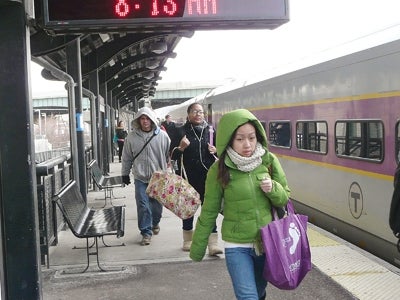The Massachusetts Department of Transportation board voted unanimously Wednesday to change operators of the state’s expansive commuter rail network, awarding a lucrative $2.69 billion contract for the next eight years to the French rail company Keolis.
The unanimous vote came after the MassDOT board of directors heard concerns from the current operator – the Massachusetts Bay Commuter Rail Co. (MBCR) – about the evaluation process and from union members worried about whether Keolis had deliberately low-balled labor cost estimates to underbid MBCR.
“To ensure continued safe, reliable and affordable commuter rail services for MBTA customers, the MBTA conducted a competitive procurement process that has been extremely thorough, transparent — and, typical of similar complex transit services procurements of this nature — has spanned more than two years,” MBTA General Manager Beverly Scott told the board.
The board voted 6-0 to accept Scott’s recommendation that the contract be awarded to Keolis over MBCR, which has held the contract since 2003. Transportation Secretary Richard Davey recused himself from the process because of his past employment with MBCR.
The contract would include an option to extend it for four years at a total cost not to exceed $4.26 billion. Representatives from both MBCR and Keolis declined to comment after the vote, but said statements would be forthcoming.
MBCR could file a bid protest with the U.S. Department of Transportation if it feels strongly that appropriate protocols were not followed, and a spokeswoman said all options would be reviewed.
Scott said the new contract includes a “no excuse” expectation that trains will run on time, and eliminates performance-related financial incentives while raising the cap on potential annual penalties for inadequate or late service from $3 million to $12 million. Transportation officials said Keolis received a stronger evaluation than MBCR on both its pricing and its operations and maintenance plans.
In addition to pricing, Keolis was scored better by MBTA evaluation teams on management, information technology and engineering services, while MBCR was rated higher for its proposal to utilize disadvantaged businesses.
Keolis America President Steve Townsend spoke only briefly to the board, indicating the company was committed to honoring the existing terms of labor contracts until new collective bargaining agreements can be reached, and that Kelios values diversity. The contract calls for employees to be rehired by Keolis based on seniority under the terms of their current contracts.
Keolis’s bid for the eight-year contract came in at $184 million under MBCR’s best and final offer, and could be up to $254 million cheaper over 12 years. Calling the Keolis bid the “best combination of quality and price,” Scott said the most significant cost differences between the proposals were profit margin and human resources and administration costs. Keolis will be paid $304 million in the first year of its contract, down from the $316 million being paid this year to MBCR.
MBCR Chairman James O’Leary, addressing the board, said his company had more than 10 years of experience operating the system’s aging fleet of trains, with a 95 percent on-time performance. “We’re proud of our record,” he said.
O’Leary asked that the board delay its decision, lamenting over how management and employees first heard the recommendation that the contract would be awarded to Keolis by reading it in the Boston Globe over the weekend. He said the fact that his team was only given a 45-minute interview in September and posed with just 11 questions from MBTA staff was highly unusual.
“This process must be stopped,” O’Leary said.

